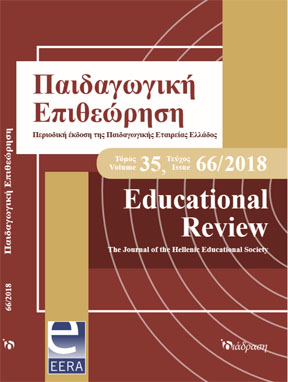H παιδική λογοτεχνία στην ψηφιακή εποχή: To διαδίκτυο ως θεματική και ως δυναμική στο νεανικό μυθιστόρημα στην Ελλάδα
Main Article Content
Περίληψη
Print literature is gradually supplanted by digital texts, which occupy an increasing part of the market. Digital texts excel their print antecedents in navigation features, various types of interactivity and access to web resources, elements that transform the reader to a “wreader” or even a “prosumer”, meaning a co-creator. Nowadays, an even more revolutionary evolution takes place in digital environments: transmedial narrative. It refers to a process in which integral elements of a story are systematically dispersed across multiple distribution channels, in order to create a unified and coordinated entertainment experience. The aim of the present study is to examine the status of Greek children’s and young adults’ literature in the digital era, regarding the principles set by radical theory. According to the radical theory the three fundamental properties of literature under the influence of new technologies are: interactivity, connectivity and accessibility. Researchers have proven that the influence of the digital era on the illustrated children's books internationally is quite remarkable. In Greece, although accessibility and interactivity are well supported, connectivity is still residual. To fill in the blank of the research, we aim to define Greek children’s and young adults’ literature’s place among the novelties of the cyber universe. We examine books whose titles contain the word “internet”, or any relative or contiguous ones, in order to detect features of radicalism, cyber aesthetics or even more complex interactive relations towards transmediality. According to our findings, the Internet as a thematic axis does not ensure the presence of innovative features, either in the form or in the content of the books. Interactivity as defined by the radial theory lacks and there are not spotted any attempts by the editors to develop or expand the texts on other platforms or media. The young reader's exploratory, participatory and interactive behavior is not encouraged. Greek children’s literature field seems to be reserved, not yet mature enough to take daring steps ahead.
